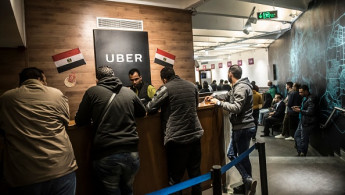'Uber is not safe': Egyptians outraged at taxi app after another woman allegedly assaulted
An Egyptian woman escaped a horrific fate after an Uber driver had allegedly assaulted and attempted to kidnap her over the weekend on the outskirts of the capital, Cairo, ranked as "the world's most dangerous megacity for women.
The suspect was arrested and interrogated by the authorities after his car and the weapon he had reportedly used to attack the victim were seized, according to a statement by the interior ministry released on Tuesday, 14 May.
For its part, Uber Egypt said in a statement run by local news outlets that it expressed its deep sorrow over the alleged incident, vowing to take necessary legal action against the perpetrator and offering support to the victim and her family.
Local news reports said that the victim confronted the suspect at the prosecution's office and identified him before she emotionally broke down as she narrated the horrendous account of events.
According to the victim, the driver cancelled the trip, ordered via her sister's Uber account shortly after taking off, and stopped the vehicle in a remote area after he said he would bring water from the trunk.
"But he brought a box cutter from the trunk and [allegedly] threatened to kill her if she did not follow his instructions," the victim's sister told talk show host Amr Adeeb during a phone interview broadcast live on Tuesday evening on MBC Misr.
She added that her sister resisted and fought back, sustaining injuries in the process until she managed to jump out of the car and run away.
The driver eventually fled the scene when a lorry driver happened to pass by the area and ran to her rescue, covering her injured body and torn clothes with a blanket until she was moved to a nearby hospital.
"When I went to see my sister after her rescuers contacted me, I found her all covered in blood," the sister recalled.
"It is time to take action against Uber…they can't maintain the safety of riders anymore," she added.
The heinous incident, which took place on Sunday, 12 May, sent shockwaves across Egypt, prompting social media activists and women's rights advocates to call for boycotting the ride-hailing app and hold the company responsible for falling short in maintaining the safety of customers.
The hashtags "Stop using Uber" and "Uber is not safe" have gone viral over the past 48 hours as Egyptians continue to question the company's security measures placed on drivers.
The incident was the second to involve Uber in less than three months. Last month, on the very first day of the trial, a Cairo criminal court sentenced an Uber driver to 15 years in prison with hard labour.
The driver was found guilty of attempting to abduct 24-year-old Habiba El-Shamaa, who later died following a three-week coma, possessing cannabis, driving under the influence of narcotics after he tested positive for drugs following his arrest, and forging official identification papers to create an Uber account.
A lot of women have relied on @Uber in Egypt as a safe alternative for taxis. Now we find out they have a lax safety system that ignores complaints, allows drivers to register with fake licenses, & haven’t tried to fix anything since Habiba died. Uber Egypt needs to be shut down.
— Mena (@mena_ishere) May 13, 2024
In November last year, the Egyptian parliament approved new government-drafted amendments to the penal code, hardening penalties for sexual harassment and bullying crimes.
Incidents of sexual harassment, whether verbal or physical, are common in Egypt. It was not until 2008 when a Cairo court sentenced a man to three years in prison in the first-ever verdict against sexual harassment of a woman in Egypt's judicial history.
In recent years, women across Egypt have spoken out on social media about the subject as part of the #MeToo movement, as many went public and reported such atrocities.
Statistically, around 7.8 million Egyptian women undergo a form of gender-based violence every year, according to a UN survey released in 2015.
"Who monitors Uber? Who are the ones running the company? What about our children and daughters who ride Uber?" asked Adeeb rhetorically after he ended the call with the victim's sister.




 Follow the Middle East's top stories in English at The New Arab on Google News
Follow the Middle East's top stories in English at The New Arab on Google News


